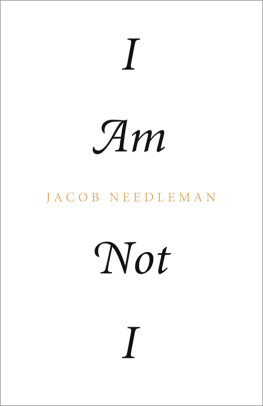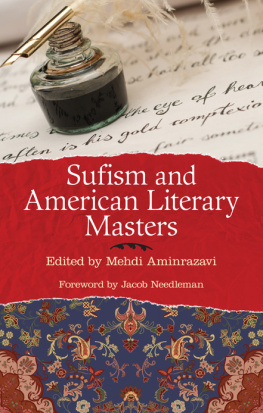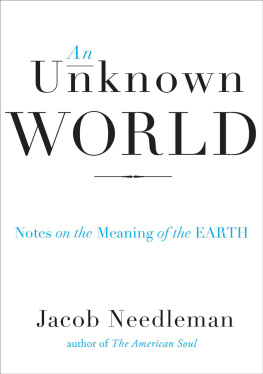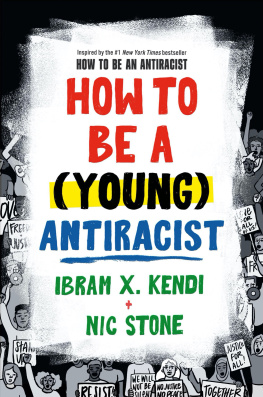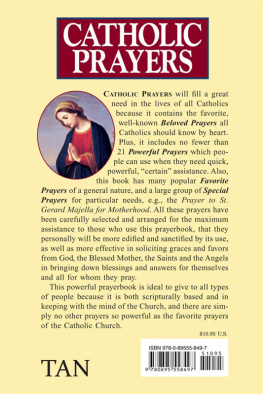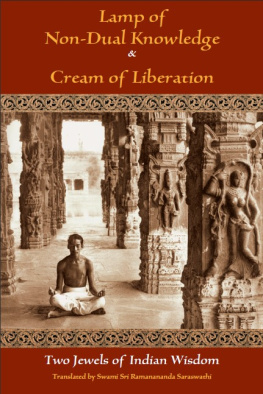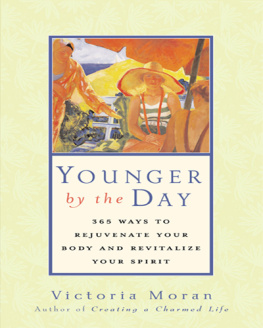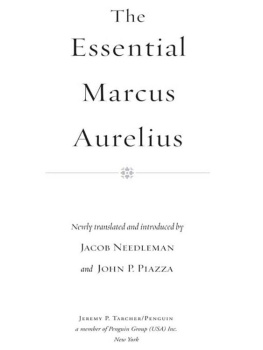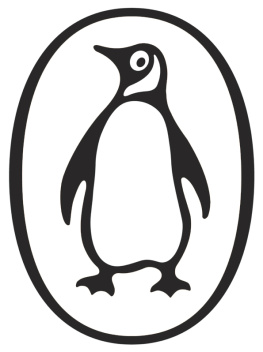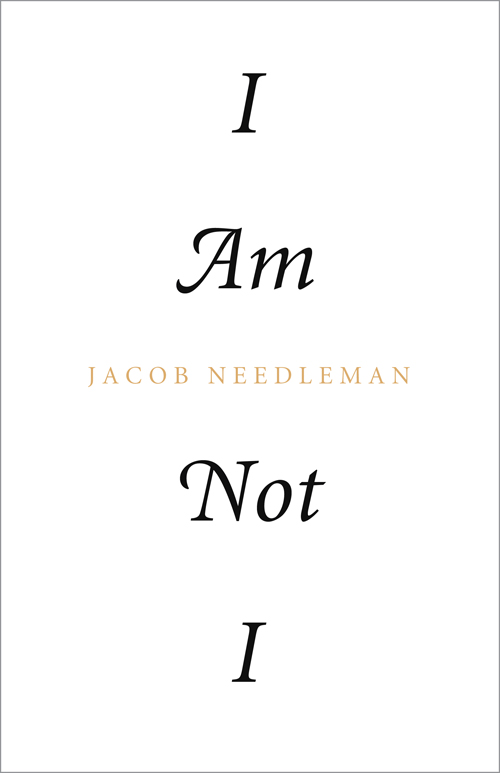
Praise for Jacob Needlemans An Unknown World
His lively prose, storytelling skills, and lucid insights draw us into an animated conversation with a brilliant teacher.
Publishers Weekly
Striking... takes some really original positions on topics that have become run into the ground by the same discussions and same assumptions.
Ken Wilbur
An immensely learned man who is unembarrassed by the big questions that many of his fellow philosophers prefer to dodge.
Chicago Tribune
For nearly four decades Jacob Needleman has confronted the central questions of our era in light of the vision that lies at the root of the worlds great spiritual traditions. Needlemans work clarifies: it takes topics that exist in disparate threads throughout our culturenew religions, esoteric Christianity, the founding mythos of Americaand frames them in a manner both sensible and deeply questioning.
Parabola
ALSO BY JACOB NEEDLEMAN
An Unknown World: Notes on the Meaning of the Earth
What Is God?
Why Cant We Be Good?
The American Soul
Time and the Soul
The Wisdom of Love
Money and the Meaning of Life
The Heart of Philosophy
Lost Christianity
The Way of the Physician
A Sense of the Cosmos
The Indestructible Question
Sorcerers (a novel)
The New Religions
The Essential Marcus Aurelius (with John P. Piazza)
The Sword of Gnosis (editor)
I Am Not I
JACOB NEEDLEMAN

North Atlantic Books
Berkeley, California
Copyright 2016 by Jacob Needleman. All rights reserved. No portion of this book, except for brief review, may be reproduced, stored in a retrieval system, or transmitted in any form or by any meanselectronic, mechanical, photocopying, recording, or otherwisewithout the written permission of the publisher. For information contact North Atlantic Books.
Published by
North Atlantic Books
Berkeley, California
Cover design by John Yates
I Am Not I is sponsored and published by the Society for the Study of Native Arts and Sciences (dba North Atlantic Books), an educational nonprofit based in Berkeley, California, that collaborates with partners to develop cross-cultural perspectives, nurture holistic views of art, science, the humanities, and healing, and seed personal and global transformation by publishing work on the relationship of body, spirit, and nature.
North Atlantic Books publications are available through most bookstores. For further information, visit our website at www.northatlanticbooks.com or call 800-733-3000.
Library of Congress Cataloging-in-Publication Data
Names: Needleman, Jacob.
Title: I am not I / Jacob Needleman.
Description: Berkeley, CA : North Atlantic Books, 2016.
Identifiers: LCCN 2015035121 | ISBN 9781623170141 (pbk.)
ISBN 9781623170158 (ebook)
Subjects: LCSH: Self (Philosophy) | Ontology.
Classification: LCC BD438.5 .N33 2016 | DDC 126dc23
LC record available at http://lccn.loc.gov/2015035121
FOR GAIL FOREVER
I am not I.
I am this one
that walks by my side
without me seeing him,
the one I sometimes go to see
and who sometimes I forget.
The one who is silent, serene, when I am talking,
the one who forgives, sweet, when I hate,
the one who goes where I am not,
the one who will remain standing
when I die.
J UAN R AMN J IMNEZ
(trans. Jacob Needleman)
Table of Contents
A mong the great questions of the human heart, none is more central than the question, Who am I? And among the great answers of the human spirit, none is more central than the experience of I Am. In fact, in the course of an intensely lived human lifea normal human life filled with the search for Truththis question and this answer eventually run parallel to each other, coming closer and closer together until the question becomes the answer and the answer becomes the question.
The present book seeks to unpack these seemingly obscure assertions through a literary form suited to the contemporary psyche, starved as that psyche is for the feeling of Truth.
Not long after I began my career as a professor of philosophy, I discovered that there exists in many people a hidden yearning for metaphysical thought, for ideas about reality and human life that bring the hope of discovering a great purpose in the universe and, correspondingly, in ones own given life.
Again and again I witnessed the remarkable effect that certain kinds of philosophical ideas and questions can have on the state of mind, not only in my students, but in men and women of all ages whom I happened to meet outside of the academic setting. The effect of such ideas and questions was unmistakablein the light in the eyes, and often in the way the individual suddenly adjusted his or her posture. Something unique was awakening in the mind.
At first, I attributed what I saw mainly to the great ideas themselves, which stimulate the mind to ponder questions of ultimate meaning and purposequestions that the current scientific worldview delegitimizes through its materialist standards of logic and evidence. It troubled me to see how so many contemporary explanations of higher human facultieslove, art, religious feeling, and even scientific thought itselfreduced these faculties to mechanically evolved automatisms, serving such goals as meaningless physical survival and meaningless physical or egoistic pleasure. It troubled me to see the dominance of toxic ideas and concepts that offer no hope for the attainment of the transcendence that is the unique possibility written into the very essence of human consciousness. Such toxic ideas and the worldview they engender cannot help but have a dark effect on the aspirations and morals of entire peoples, whether consciously or unconsciously.
I was especially concerned about how this situation plays out in the education and development of the younger generation of men and women, as represented by my students at the university. They come to my classes immersed in habits of thought and explanation that flatten both their perception of the world and their sense of identity. It is so even when they show up already intensely interested in philosophical questions, or great works of art and literature, or the astonishing discoveries of modern science. And it is so even when they come achingly hoping to help this world or even just to make sense of the heartbreaking storms of injustice, human suffering, and corruption raging throughout our civilization. Always, in almost all of these young men and women, their entrenched standards of thought and understanding, shaped by a toxic tangle of ideas about the universe, human nature, and Great Nature itself, have locked their minds in an airless reality devoid of intrinsic meaning and purpose.
And here they are in front of me, notebooks or laptops at the ready. On the screen in front of them or within easy reach is their assigned reading.
The text could be a selection from the Dialogues of Plato, with its profoundly scripted drama of the conversations of Socrates, compelling us to ask ourselves: Is it actually true that we human beings, including I myself, live our lives within the dim caves of illusion, never to be aware of genuine truth and goodness? And is it true that there are rare individuals quietly reaching down to us from another level of understanding, calling us to searchwith their helpfor our own real mind and heart? Could all this be actually true of ourselves now and here, and not merely an ancient or academic question?

